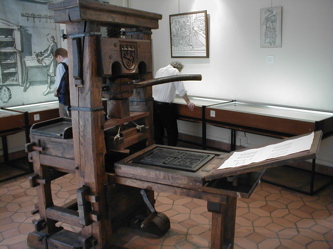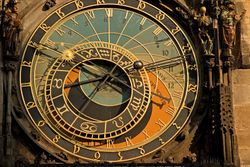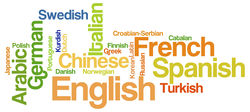Difference between revisions of "Category:1450s"
| (26 intermediate revisions by the same user not shown) | |||
| Line 4: | Line 4: | ||
{| cellpadding="2" cellspacing="5" style="width:100%; vertical-align:top; background:transparent;" | {| cellpadding="2" cellspacing="5" style="width:100%; vertical-align:top; background:transparent;" | ||
{{WindowMain | {{WindowMain | ||
|title= 1450s (Home Page) | |title= History of Research--1450s (Home Page) | ||
|backgroundLogo= Bluebg_rounded_croped.png | |backgroundLogo= Bluebg_rounded_croped.png | ||
|logo= history.png | |logo= history.png | ||
|px= 38 | |px= 38 | ||
|content= [[File:Gutenberg Press.jpg| | |content= [[File:Gutenberg Press.jpg|550px]] | ||
The page: '''1450s''', is the gateway that gives access to scholarly and fictional works in the field of [[Main Page|Jewish, Christian, and Islamic Origins]] made in the 1450s, or from 1450 to 1499. | The page: '''1450s''', is the gateway that gives access to scholarly and fictional works in the field of [[Main Page|Jewish, Christian, and Islamic Origins]] made in the [[1450s|second half of the 15th century]], or from 1450 to 1499. | ||
* '''[[Scholarship]] (1450s)''' : [[Apocalyptic Studies | |||
<p style="margin-top:-10px;font-size:300%">'''-- [[:Category:Made in the 1450s|1450-1459]] -- [[:Category:Made in the 1460s|1460-1469]] -- -- [[:Category:Made in the 1470s|1470-1479]] -- [[:Category:Made in the 1480s|1480-1489]] -- -- [[:Category:Made in the 1490s|1490-1499]] --''' </p> | |||
* '''[[Scholarship]] (1450s)''' : [[Apocalyptic Studies (1450s)]] -- [[Bible Studies (1450s)]] -- [[Christian Origins Studies (1450s)]] -- [[Early Christian Studies (1450s)]] -- [[Early Islamic Studies (1450s)]] -- [[Early Jewish Studies (1450s)]] -- [[Enochic Studies (1450s)]] -- [[Gospels Studies (1450s)]] -- [[Hebrew Bible Studies (1450s)]] -- [[Hellenistic-Jewish Studies (1450s)]] -- [[Historical Jesus Studies (1450s)]] -- [[Johannine Studies (1450s)]] -- [[Josephus Studies (1450s)]] -- [[New Testament Studies (1450s)]] -- [[NT Apocrypha Studies (1450s)]] -- [[OT Apocrypha Studies (1450s)]] -- [[Pauline Studies (1450s)]] -- [[Petrine Studies (1450s)]] -- [[Second Temple Studies (1450s)]] -- [[Wisdom Studies (1450s)]] -- [[Women's Studies (1450s)]] -/- [[Jewish Authorship (1450s)]] -- [[Women Authorship (1450s)]] | |||
* '''[[Fiction]] (1450s)''' : [[Art (1450s)]] -- [[Cinema (1450s)]] -- [[Dance (1450s)]] -- [[Literature (1450s)]] -- [[Music (1450s)]] | * '''[[Fiction]] (1450s)''' : [[Art (1450s)]] -- [[Cinema (1450s)]] -- [[Dance (1450s)]] -- [[Literature (1450s)]] -- [[Music (1450s)]] | ||
| Line 19: | Line 22: | ||
* '''[[Languages]] (1450s)''' : [[:Category:English language--1450s|English (1450s)]] - [[:Category:French language--1450s|French (1450s)]] - [[:Category:German language--1450s|German (1450s)]] - [[:Category:Italian language--1450s|Italian (1450s)]] - [[:Category:Spanish language--1450s|Spanish (1450s)]] -/- [[Translations (1450s)]] | * '''[[Languages]] (1450s)''' : [[:Category:English language--1450s|English (1450s)]] - [[:Category:French language--1450s|French (1450s)]] - [[:Category:German language--1450s|German (1450s)]] - [[:Category:Italian language--1450s|Italian (1450s)]] - [[:Category:Spanish language--1450s|Spanish (1450s)]] -/- [[Translations (1450s)]] | ||
* '''[[Biographies]]''' : [[:Category:Born in 1450s|Born in 1450s]] -- [[:Category:Died in 1450s|Died in 1450s]] | |||
[[ | |||
[[ | |||
}} | }} | ||
| Line 64: | Line 40: | ||
|content= [[File:Timeline.jpg|thumb|left|250px]] | |content= [[File:Timeline.jpg|thumb|left|250px]] | ||
'''[[Timeline]]''' : [[2020s]] -- [[2010s]] -- [[2000s]] -- [[1990s]] -- [[1980s]] -- [[1970s]] -- [[1960s]] -- [[1950s]] -- [[1940s]] -- [[1930s]] -- [[1920s]] -- [[1910s]] -- [[1900s]] -- [[1850s]] -- [[1800s]] -- [[1700s]] -- [[1600s]] -- [[1500s]] -- [[1450s]] -- [[ | '''[[Timeline]]''' : [[2020s]] -- [[2010s]] -- [[2000s]] -- [[1990s]] -- [[1980s]] -- [[1970s]] -- [[1960s]] -- [[1950s]] -- [[1940s]] -- [[1930s]] -- [[1920s]] -- [[1910s]] -- [[1900s]] -- [[1850s]] -- [[1800s]] -- [[1700s]] -- [[1600s]] -- [[1500s]] -- [[1450s]] -- [[Medieval]] -- [[Timeline|Home]] | ||
}} | }} | ||
| Line 76: | Line 52: | ||
'''[[Languages]]''' : [[:Category:English language--1450s|English (1450s)]] - [[:Category:French language--1450s|French (1450s)]] - [[:Category:German language--1450s|German (1450s)]] - [[:Category:Italian language--1450s|Italian (1450s)]] - [[:Category:Spanish language--1450s|Spanish (1450s)]] -//- [[:Category:Translations--1450s|Translations (1450s)]] | '''[[Languages]]''' : [[:Category:English language--1450s|English (1450s)]] - [[:Category:French language--1450s|French (1450s)]] - [[:Category:German language--1450s|German (1450s)]] - [[:Category:Italian language--1450s|Italian (1450s)]] - [[:Category:Spanish language--1450s|Spanish (1450s)]] -//- [[:Category:Translations--1450s|Translations (1450s)]] | ||
}} | }} | ||
|} | |||
|} | |||
== Highlights (1450s) == | |||
==== 1450s ==== | |||
* [[Gutenberg Bible (1452-1455 Gutenberg), edited volume]] | |||
| | ==== 1470s ==== | ||
| | * [[De antiquitate Judaica. De bello Judaico (1470 Schüssler), book (ed. princeps - Latin)]] | ||
* [[ספר יוסיפון (Josippon / 1474-76 Conat), book (Hebrew / ed. princeps)]] | |||
* [[Storie sacre (1475c Tornabuoni), poetry]] | |||
==== 1490s ==== | |||
* [[Mishnah ~ ed. princeps (1492 Soncino), book]] | |||
== Overview (1450s) == | |||
After the ''editio princeps'' of the Latin Bible (including the [[OT Apocrypha]] and the [[New Testament]]) by [[Johannes Gutenberg]] in 1452-55, the study of Second Temple Judaism and Christian Origins began with the publication of the Latin text of [[Josephus]] (1470) and the Hebrew text of [[Josippon]] (1474-76). Christian Cabalists, like [[Giovanni Pico della Mirandola]] and [[Johannes Reuchlin]], began emphasizing the importance of "post-biblical" Jewish (and Islamic) literature as a source for recovering the primeval wisdom of Enoch. | |||
For the first time Second Temple Jewish subjects inspired literary works by authors like [[Feo Belcari]], [[Antonio Cornazzano]], [[Lucrezia Tornabuoni]] and her son [[Lorenzo de' Medici]]. | |||
== Interpreters == | |||
<gallery> | |||
File:Giovanni Pico della Mirandola.jpg|[[Giovanni Pico della Mirandola]] (1463-1494) | |||
File:Lucrezia Tornabuoni.jpg|[[Lucrezia Tornabuoni]] <br> (1425-1482) | |||
File:Johannes Gutenberg.jpg|[[Johannes Gutenberg]] | |||
File:Lorenzo Medici.jpg|thumb|150px|[[Lorenzo de' Medici]] | |||
</gallery> | |||
Latest revision as of 15:10, 29 September 2023
Highlights (1450s)
1450s
1470s
- De antiquitate Judaica. De bello Judaico (1470 Schüssler), book (ed. princeps - Latin)
- ספר יוסיפון (Josippon / 1474-76 Conat), book (Hebrew / ed. princeps)
- Storie sacre (1475c Tornabuoni), poetry
1490s
Overview (1450s)
After the editio princeps of the Latin Bible (including the OT Apocrypha and the New Testament) by Johannes Gutenberg in 1452-55, the study of Second Temple Judaism and Christian Origins began with the publication of the Latin text of Josephus (1470) and the Hebrew text of Josippon (1474-76). Christian Cabalists, like Giovanni Pico della Mirandola and Johannes Reuchlin, began emphasizing the importance of "post-biblical" Jewish (and Islamic) literature as a source for recovering the primeval wisdom of Enoch.
For the first time Second Temple Jewish subjects inspired literary works by authors like Feo Belcari, Antonio Cornazzano, Lucrezia Tornabuoni and her son Lorenzo de' Medici.
Interpreters
Giovanni Pico della Mirandola (1463-1494)
Lucrezia Tornabuoni
(1425-1482)
Pages in category "1450s"
The following 34 pages are in this category, out of 34 total.
'
- Apocalyptic Studies (1450s)
- Archaeology (1450s)
- Bible Studies (1450s)
- Christian Origins Studies (1450s)
- Early Christian Studies (1450s)
- Early Islamic Studies (1450s)
- Early Jewish Studies (1450s)
- Enochic Studies (1450s)
- Gospels Studies (1450s)
- Hebrew Bible Studies (1450s)
- Hellenistic-Jewish Studies (1450s)
- Historical Jesus Studies (1450s)
- Johannine Studies (1450s)
- Josephus Studies (1450s)
- New Testament Studies (1450s)
- NT Apocrypha Studies (1450s)
- OT Apocrypha Studies (1450s)
- Pauline Studies (1450s)
- Petrine Studies (1450s)
- Second Temple Studies (1450s)
- Wisdom Studies (1450s)
- Women's & Gender Studies (1450s)
Media in category "1450s"
This category contains only the following file.
- 1492 * Soncino.jpg 772 × 1,024; 207 KB







